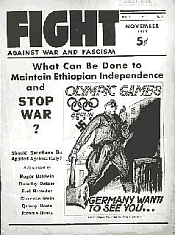
Boycott Movement
A Nightmare Begins
With Hitler and the Nazis’ rise to power came the German persecution of the Jewish and Romani. Beginning in April 1933, all German athletic organizations instituted an “Aryans only” policy. This excluded all Jews, part-Jews, and Romani athletes from all sports facilities and associations. Notable athletes living in Germany at the time such as Erich Seelig, Daniel Prenn, Gretel Bergmann, and Johann Rukelie Trollmann were all prohibited from competing in their respective sports simply because they were Jewish. Banned Jewish athletes flocked to separate facilities and organizations, but these were incomparable to the well-funded German facilities.
These new Nazi policies were incredibly troubling to the rest of the world, especially with the impending Olympics. The Games were meant to promote an environment of racial equality among all the different nations competing, and the Nazi agenda seemed to be undermining this very fundamental concept. As a result, many nations began to call for a boycott of the Berlin Games and suggested the Games be moved to a different nation. This was the first time in Olympic history that Europeans and Americans had called for a boycott. For Germany, the threat of major nations such as America, England, and France not participating in the Games served as a warning to the Nazis to be very careful about their actions.


America's Dilemma
The issue of whether or not to boycott was especially controversial in the United States, the country that had sent the most athletes to past Olympics and usually won the most medals. Avery Brundage, president of the American Olympic Committee at the time, initially supported the international boycott movement. He, too, believed that the racist attitudes of the Nazis made Germany unfit to host the Games, saying "The very foundation of the modern Olympic revival will be undermined if individual countries are allowed to restrict participation by reason of class, creed, or race." Recognizing Brundage as a crucial figure in determining the success of the Berlin Games, the Nazis invited Brundage to tour German facilities for himself. Impressed by his findings in Germany, he returned with the completely opposite mindset.
Even though Brundage had changed his mind, still more Americans supported the boycott. Jeremiah Mahoney, leader of the Amateur Athletic Union, was particularly outspoken about the issue. From Mahoney’s point of view, participating in the Games would be synonymous with endorsing Hitler’s Reich. Along with Mahoney supporting the boycott were politicians including Fiorello La Guardia, Al Smith, and James Curley. The issue of boycott even prompted the ejection of Ernst Lee Jahncke from the IOC - the only ejection to ever occur in the history of IOC. With the increasing tension growing, the Nazis allowed a singular athlete of Jewish descent to participate in the Games: Helene Mayer. In the end, Avery Brundage was successful in convincing athletes to participate. The ultimate verdict was decided when The American Amateur Athletic Union narrowly voted the boycott proposal down. The Americans were to compete in the 1936 Berlin Olympics.